
Financial Planning
2022 Has Taken the Lives of Anne Heche, Ray Liotta, Coolio, Kristie Alley, tWitch and Many More – When a Loved One Passes, How Are We Supposed to Manage Our Finances?
We are in the spotlight












When a loved one passes away, it can have an immense emotional toll on the family that is left behind. Grief is a normal reaction to death and although no two people will experience it in exactly the same way, there are some common phases of grief that almost all individuals experience, including anger, sadness, fear, and acceptance, among others. Grief can be difficult for families to navigate as each family member may feel and express that loss differently. It’s important for family and friends to provide support to one another by listening without judgment and offering comfort at the right times, in the right ways for the person grieving. Grief can often be so powerful that it disrupts daily life, and when it does, we should seek out professional help through therapy or peer counseling, both of which can be especially useful if any unresolved issues between family members or peers arise due to the death of a loved one. No matter the circumstances behind it, the death of a loved one is devastating, regardless of whether it is expected or sudden. When death is sudden, one’s entire family can be left in shock and unprepared for the financial burden that comes along with it. Not only do families have to cope with the emotional distress of losing someone close to them, but now they must also face the financial encumbrances that follow suit. Funeral costs alone can range from $5,000 - $15,000 depending on what type of service you choose or your location of residence, and that’s before factoring in any burial or cremation services and other related expenses. On top of this, there could be pre-existing debts or loans that may be passed onto your family members for repayment if your loved one did not have enough saved up in life insurance or retirement funds. Death can obliterate the status quo and leave us asking a lot of questions about the future. We want to take some time here to address what death can look like for different people, how to financially equip yourself at different decades in your life to ensure that your departure doesn’t leave your family reeling, and how a financial advisor can prove invaluable in organizing yourself to meet that end. There’s no way we could possibly address every noteworthy individual we lost in 2022, but chances are each of us lost someone important to us, either because they were our friend or family member, or because they were a high-profile influence who had a positive impact on our lives. It’s not a requirement that you need to personally know someone to grieve their death, and we want to take a moment to address just a few of the public figures that are no longer with us, and reflect on the legacies they left behind. Anne Heche was a highly versatile American actress, director, and screenwriter. She began her career as a stage actress before she transitioned to television and film. Her breakthrough performance came in the 1998 movie "Six Days Seven Nights" which earned her a Blockbuster Entertainment Award nomination for Favorite Actress - Adventure/Comedy. Throughout her career, Anne Heche earned several awards including Emmy nominations for her roles in the TV movie "Gracie's Choice" (2004) and the series "Men In Trees" (2007). She also won a Daytime Emmy Award for Outstanding Special Class Series for writing the HBO documentary series "A Family Is A Family Is A Family: A Rosie O'Donnell Celebration” (2010). As such a prodigious Hollywood talent, it was startling when she passed at the relatively young 53 years old, the result of a fatal car accident. Ray Liotta is an iconic Hollywood actor whose career spanned over four decades and countless memorable roles. From his breakout performance in Martin Scorsese’s ‘Goodfellas’ to his portrayal of a hard-edged cop in the crime drama ‘Something Wild,’ Liotta consistently delivered powerful performances that shaped modern cinema. Ray Liotta is often remembered for his intense onscreen presence and his ability to bring characters to life with a unique blend of vulnerability and power. His impressive resume includes acclaimed performances in films like ‘Field of Dreams,’ ‘Wild Hogs,’ and the action blockbuster ‘Hannibal Rising.’ When an actor or actress has this much influence and presence, it’s easy for them to reach an iconic status, with thousands of people considering them role models, and thus collectively grieving their deaths when they leave us. Ray passed at the age of 67 suddenly and without discernible cause, another example of why people should always be prepared. Death is inevitable, but it’s not predictable. The responsibility falls on each of us to stay ahead of it, for our sakes and the sake of our families. Coolio, born Artis Leon Ivey Jr., was an American rapper and actor who rose to fame in the mid-90s. His career began in 1994 with the hit single "Fantastic Voyage", which peaked at No. 3 on the Billboard Hot 100. He went on to attain even greater success with his 1995 Grammy Award-winning album, “It Takes a Thief,” which featured genre classics such as "Gangsta's Paradise" and "1, 2, 3, 4 (Sumpin' New).” Coolio became one of the most recognizable names in music during this time period, as he released a string of hit singles over the next decade. Coolio passed away prematurely and without any reported warning. He was 59, well below the American male life expectancy of 77, startling family and fans alike. While some deaths can be anticipated and prepared for, Coolio is an example of how we can’t trust statistical averages to guide us to any certain destinations. Sometimes life just happens. Kirstie Alley is an American actress, comedian and spokesmodel best known for her work on the sitcom Cheers. Her career spans more than four decades, during which she has won numerous awards, including two Emmy Awards and a Golden Globe Award. In addition to her acting credits, Kirstie Alley is also known for being a fitness icon as well as a dedicated supporter of animal rights causes. Born in Wichita, Kansas, Kirstie Alley began her career as an interior design major at Kansas State University before transitioning into television commercials and modeling jobs. She made her film debut in 1982 with Star Trek II: The Wrath of Khan and went on to star in films such as Look Who's Talking (1989) and its sequels alongside John Travolta. Stephen Boss, or "tWitch,” was a well-known American dancer and choreographer. He was born in Montgomery, Alabama in 1982 and began his dancing career at the age of seven. Throughout his career he has been involved with many projects including shows like “So You Think You Can Dance” and “America's Best Dance Crew”. He is best known for his high energy dance moves and unique style of choreography which often includes stunts and flips. tWitch is also well-known for being an advocate of the hip hop dance scene. He established The Lab Creative Arts Studio to give back to the community by providing quality teaching resources to young dancers from all backgrounds. He frequently travels around the world giving masterclasses on dance and inspiring others to pursue their dreams. Stephen Boss passed at the incredibly young age of 40. Ivana Trump is a well-known businesswoman and socialite. She was the first wife of President Donald Trump, and is the mother of Donald Jr., Ivanka, and Eric Trump. Ivana has had an impressive career as an author, entrepreneur, fashion designer, actress, philanthropist and TV personality, dipping her feet in a multitude of arenas and finding success in each. Throughout her life she has made a name for herself in various industries including real estate and fashion. In addition to running several businesses, Ivana also wrote four books about her experiences with divorce, relationships and success in business. She passed at the age of 73 and has left a notable vacancy in the ranks of business celebrities. It’s not unusual for people to start considering their mortality as they age into their 60’s and 70’s, and begin organizing what will happen to their belongings should they pass. With someone of Ivana’s age, business savviness, and assets, it’s a certainty that she’d taken precautions to figure out what would happen to those assets after she passed. The legendary singer-songwriter Meatloaf left an indelible mark on the world of music. Born Marvin Lee Aday, he was best known for his iconic 1977 album “Bat Out of Hell,” which sold over 43 million copies worldwide and is one of the highest selling albums in history. His other chart-topping hits included "I'd Do Anything for Love (But I Won't Do That)" and "Two Out of Three Ain't Bad." Meatloaf was a ground-breaking artist who blended classic rock with Broadway show tunes to create a unique sound that fans loved. He continued to tour extensively throughout his career, playing sold out shows around the world. He also made notable appearances in movies such as Fight Club and Spiceworld: The Movie. His influence extended beyond music, inspiring people to pursue their dreams no matter what obstacles they faced, so it was a painful loss when he passed at age 74, with many people making tributes to the late musician in honor of his legacy. Losing loved ones make us reconsider our finances and the possibility of our own death in the future, as our income goals might be off track, costs of children must be accounted for, and all of our responsibilities are passed along to our partner or confidant. “When a loved one passes away, their family is faced with immediate expenses," says Leonard Kim of AdvisorCheck. "If a family decides to cremate their loved one, in Southern California, the cost for this service is just under $4,000. If they decide to bury their loved one, costs in Southern California start at around $6,500 for the casket, embalming and dressing of the family, service to the cemetery and death certificate permit, that is paid to the mortuary. In addition to what is paid at the mortuary, the cemetery would require upwards of $6,500 and in most cases, $13,000, to bury the family member, provide a headstone and all the additional services required to bury a family member. If these are not paid in advance, then the burden is passed down to the living relatives, to be covered within less than 10 days from their passing," Leonard continued. In addition to the burial and funeral costs, families who do not take the time to properly do their estate planning, financial circumstances tend to be quite dire," Leonard Kim stated. "For example, most of the time, the debt is passed down to the spouse and/or the children, and they become responsible for taking care of the credit card payments, loans and so forth. This puts their credit and financial obligations at a severe disadvantage, and could potentially toss them off track of their own financial goals. By having the proper security measures in place, one is able to grieve properly without having the additional stressors of dealing with debilitating financial issues on top of the loss of such a treasured family member.” Nobody likes to think about dying in their 40’s. Statistically, that’s only halfway through the average lifespan. But it can and does happen, so pretending it doesn’t won’t do us any favors, that’s why it’s important to start considering important post-mortem details, especially if you’re married with children. The foremost consideration should be the organization of an estate plan. Estate planning involves creating an organized way of managing your assets and deciding how they will be distributed after you pass away. It also helps ensure that your wishes are respected in regards to how you want possessions, investments, and property divided upon death, including everything from retirement funds to personal belongings. It offers peace of mind knowing that everything will be handled according to your wishes, rather than the whims of family members or the state government. An estate plan also ensures that taxes and other financial obligations are taken care of properly so beneficiaries won't have any additional stress during a difficult time. You are never too young to start organizing an estate plan. Here’s a handful of crucial financial considerations to make when the time comes for you to put yours together: In many ways, prematurely dying in your 50’s is not too different from the course of action you ought to take in your 40’s, but it’s not without some differences. Depending on if/when you had children, those children may now be grown and out of the house, so you don’t need to figure out how your assets will be used for their schooling. You may also have more assets and investments now, and should update your estate plan accordingly. Do you have more vehicles now than you did in your 40’s? A different partner? An extra house? These are all things you should update in your estate plan if you haven’t already. Of course, if you haven’t begun an estate plan, we recommend completing that as soon as possible, following the guidance provided in the previous section. It’s also worth noting that estate plans aren’t only valuable upon death, and include more than your last will and testament. An estate plan should also include your desired medical and financial directives in case of an incapacitating incident — such as a car crash — which address who you should have Durable Power of Attorney and other important matters for delegating your wealth and responsibilities, in lieu of your mental or physical inability to do so. Retirement plans also work a little differently in your 50’s, as you have the option of catch-up contributions, which allows you to provide more to your retirement account than you could have before. Cut out any unnecessary expenses, optimize your budget, and make sure there’s no ongoing costs that you’ve neglected and don’t need, like unused subscription services. Nowadays, if you’re in your 60’s, you’re still considered relatively young (no matter what your back and hips are telling you). But you are also more vulnerable to sudden changes in health than you were in your 40’s and 50’s, so chances are you’re already thinking about how your finances will shake out in the event of your passing. Most people at this age have already established careers and saved some money, so you have a lot to work with. If you haven’t already, you should purchase a life insurance policy and consider setting aside additional funds in case there are unpaid medical bills or other losses that need to be covered, as well as create a will that outlines how you want your assets distributed. Additionally, you may want to update any beneficiaries on existing accounts such as bank accounts or retirement plans so they can receive the funds directly when needed without having to go through probate court. Finally, it’s important to review your estate plan regularly and make any necessary adjustments if your circumstances change over time. Ensure that all contact information and names are up to date, so it’s easy for the appropriate parties to find who they need, when they need them. A financial advisor can be an invaluable asset when planning your post-mortem world. Not only do they provide guidance on how to best manage your existing finances, but they can also help you plan for the future and ensure that your loved ones will be taken care of after you pass away. Make sure you avoid these mistakes when you start working with a financial advisor. A financial advisor can assist as you create an estate plan that outlines what to do with your assets upon death, including who should receive them and how much. They can also advise on any tax implications associated with inheritance or other transfers of property, as well as advise on setting up trusts for long-term income protection. Additionally, they may be able to recommend insurance products like life insurance or annuities that could provide additional benefits to those left behind after your passing. Adult children of ailing or aging parents should make it a priority to see an advisor at their earliest availability. If you believe your parents may be in a lot of debt, or you might inherit other responsibilities at their passing, it’s best to know what your options are so you can get ahead of those things while they’re still alive. We’ve addressed it a few times so far, but even though statistics suggest an average life expectancy into your late 70’s and early 80’s, nobody is promised tomorrow. Even if you’re 40 or younger, if you have assets that you want to ensure will be passed down to the right parties, it’s never too early to start organizing a plan. Don’t take chances and gamble on guaranteed futures for yourself. Seek out a financial advisor as soon as possible using our search tool and get started down a path towards peace of mind, knowing you’ve done your due diligence to your loved ones, and set them up to receive your legacy. Written by: Cooper Barham Fact checked by: Billy Quirk Reviewed by: KJ Kim Disclosure The information provided in this article was written by the research and analysis team at AdvisorCheck.com to help all consumers in their financial journeys, by providing the resources and the insights to help improve one’s financial health, make it through recessionary and inflationary periods of time, and save their earnings to use them towards building a secure financial future. Unauthorized reproduction or use of this material is strictly prohibited without prior approval. Any parties interested in content syndication, references, interviews, or PR, please contact our marketing team at marketing@aimranalytics.com AdvisorCheck.com is an independent data and analytics company founded on the principles of helping to provide transparency, simplicity, and conflict-free information to all consumers. As an independent company providing conflict-free information, Advisorcheck.com does not participate, engage with, or receive funding from any affiliate marketing programs or services. To become a free AdvisorCheck member, visit advisorcheck.com/signup. We’ve lost the lives of so many people who have impacted society in 2022. But what happens when we experience grief of our own loved ones, and what is the financial impact that death has on a family?
People We Lost in 2022
Anne Heche - Passed August 11, 2022
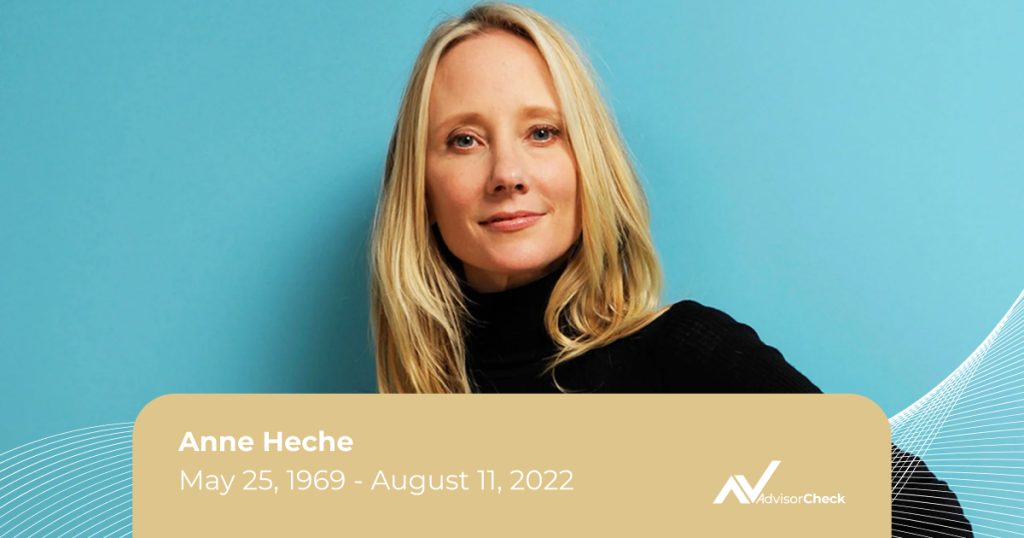
Ray Liotta - Passed May 26, 2022
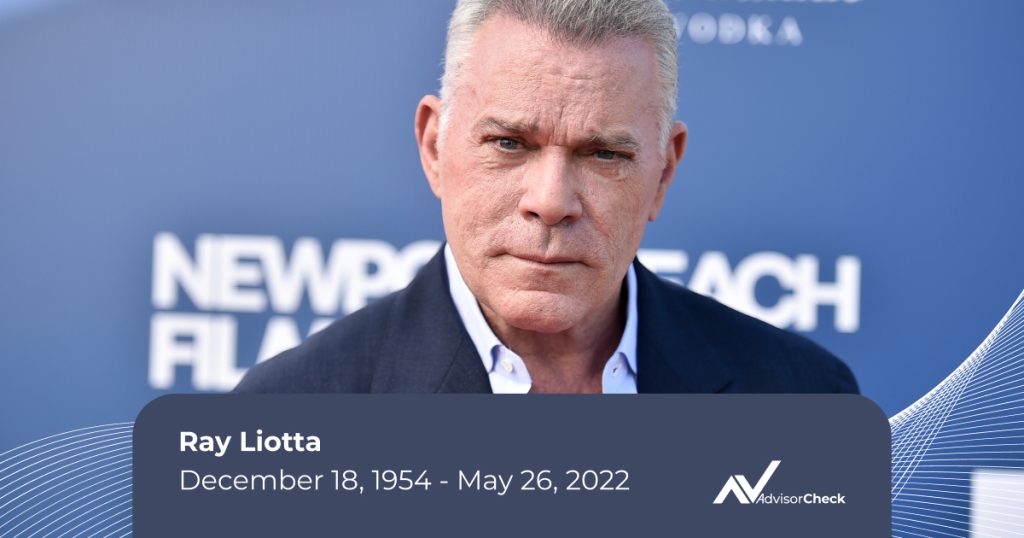
Coolio - Passed September 28, 2022
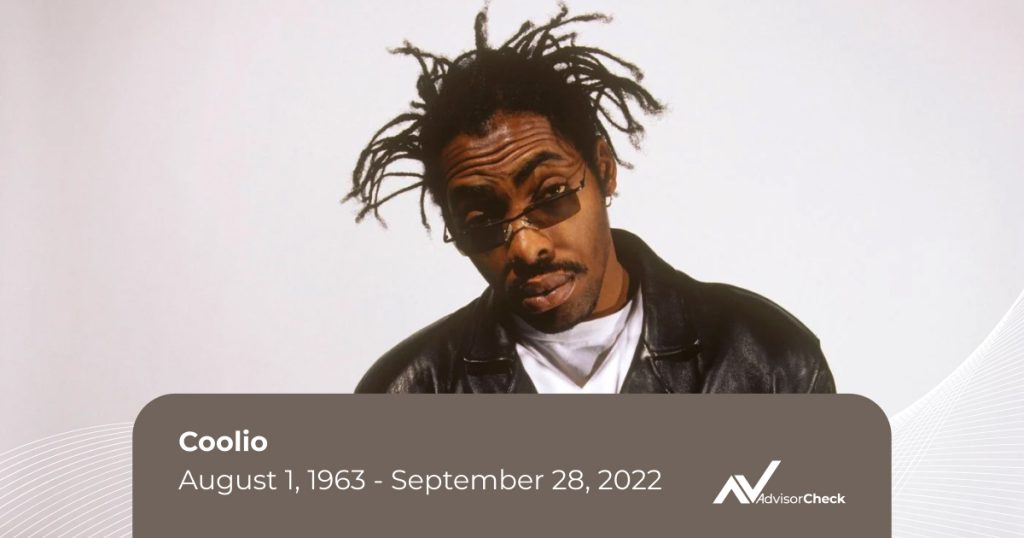
Kirstie Alley - Passed December 5, 2022
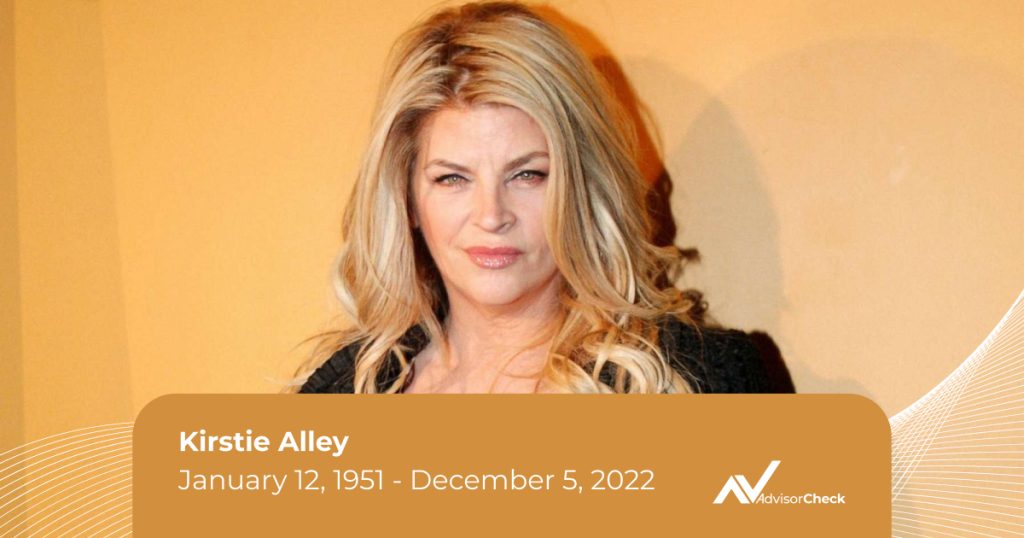
tWitch - Passed December 13, 2022
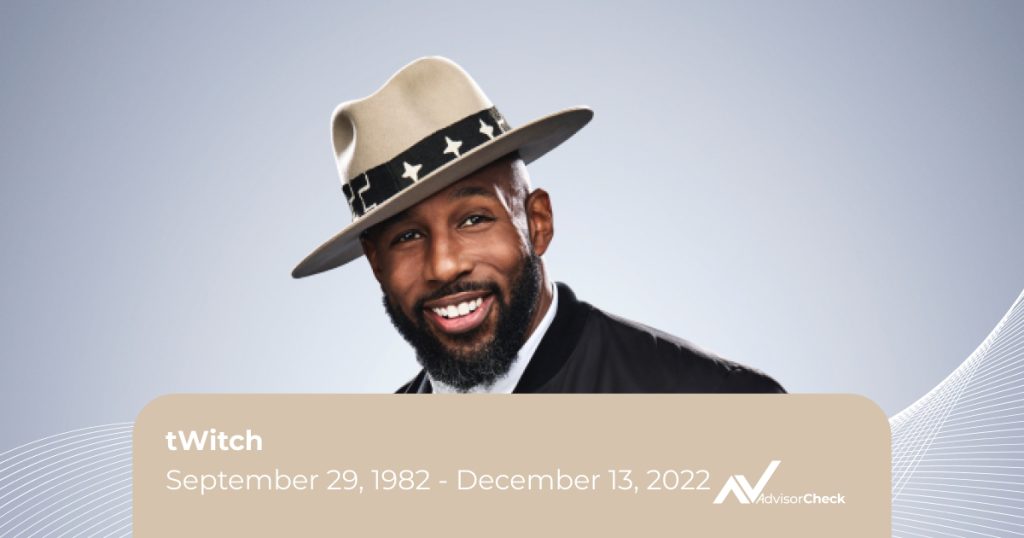
Ivana Trump - Passed July 14, 2022

Meatloaf - Passed January 20, 2022
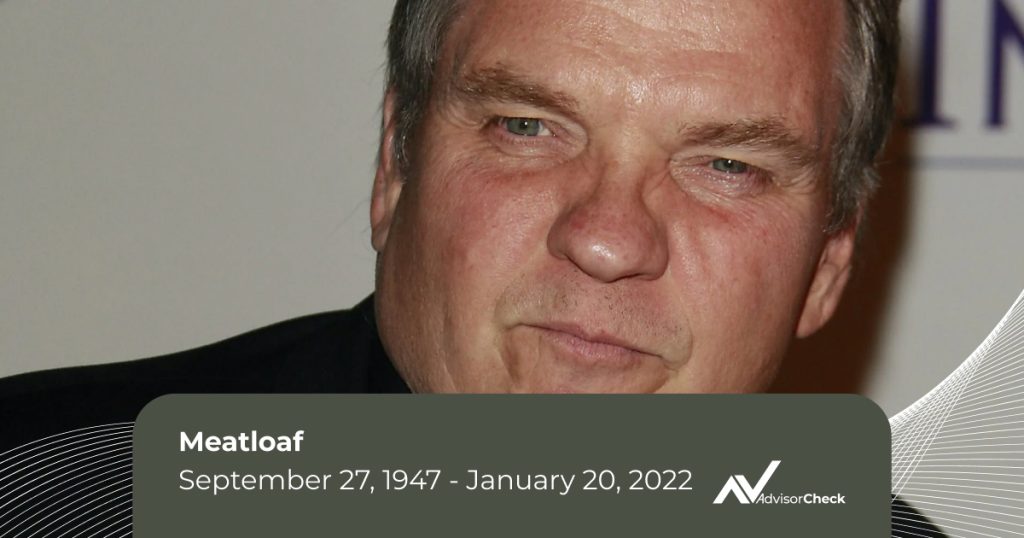
Planning for the Inevitable — Death, and its Aftermath
Death…in your 40’s
Death…in your 50’s
Death…in your 60’s, and beyond
Compassionate and Practical — How a Financial Advisor Can Help You Plan for Death

Most read
The content of video and blog articles are for informational and entertainment purposes only and do not constitute investment, tax, legal, or financial advice. Always consult with a qualified professional before making any financial decisions. The views expressed are those of the author and do not reflect the opinions or recommendations of any affiliated entities.
